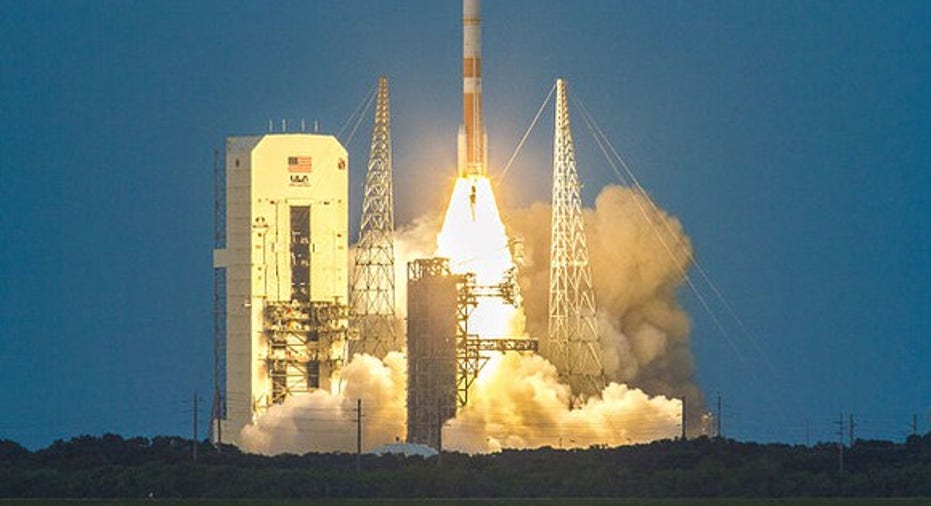Who Builds the Most Expensive Spaceships?

Boeing's Delta IV is a very big rocket -- with a price tag to match. Image source: Michael Seeley via Wikimedia Commons.
Our voyage of discovery (of potential investments) in the space industry continues.
In recent weeks, we've examined the rates that various space companies -- Boeing andLockheed Martin , and SpaceX, here at home, and Airbus' Arianespace in Europe -- charge for lofting satellites of various size into orbits of various altitude. We've also done some digging into how these "launch rates" translate into profits for the companies that charge them, all in furtherance of figuring out who the likely winners are in this industry.
One thing we have not yet specifically addressed, though, is the relative cost of the various space launch vehicles themselves. We've avoided this not because it's not important. It is: The launch vehicle is probably the most important part of a space company's "cost of goods sold," which determines its gross margin, and to a lesser extent, its operating and net profit margins as well.
Rather, we've left this subject for last because... it's really, really hard to dig up firm pricing data on these rockets. The companies just don't talk about them, preferring to bundle the cost of the launch vehicle into the total cost of the launch service sold to the customer.
But now the time has come, and we're going to take our best stab at affixing some price tags to these rockets.
SpaceX Falcon 9
Whatever you may think of the recent goings-on at Tesla and SolarCity, give Elon Musk credit for one thing: When it comes to the economics of space launches, he's made SpaceX the single most transparent space company on Earth, posting launch prices right on the SpaceX website, and, early in June, revealing the cost of building his Falcon 9 rocket as well.
$50 million. That's how much it costs to build a Falcon 9.
Next?
United Launch Alliance Delta IV and Atlas V
Though less forthcoming than SpaceX, the Boeing-and-Lockheed Martin joint venture known as United Launch Alliance nonetheless dropped some hints about its own space launch vehicles' costs last year. In an open Twitter discussion, CEO Tory Bruno confided that if you know the cost of a space launch, "you could use 15 to 20% as a rule of thumb" to estimate the cost of the rocket being launched.
Thus, when ULA saysit charges about $350 million for a Delta IV heavy rocket launch, you can probably figure that the Delta itself cost about $280 million to build. Similarly, an Atlas V launch priced at $164 million probably costs about $130 million. (This tallies, by the way, with a recent report from our friends at SpaceflightNow.com, who estimated the cost of an Atlas V at "in excess of $100 million [apiece].")
Arianespace Ariane 5
Arianespace, now majority-owned by Airbus and Safran, is even more reticent about disclosing its costs than is ULA. But can we perhaps apply ULA's "rule of thumb" to figure out what an Ariane 5 rocket costs?
I think we can. ULA estimates that a launch vehicle comprises 80% to 85% of the total cost of a space launch. SpaceX tells us that $50 million (81%) of the cost of a $62 million Falcon 9 mission comes from the rocket itself. So, it seems likely this is a pretty widely applicable rule of thumb -- maybe even wide enough to reach to Europe.
Last time we checked, Arianespace was quoting its launch pricesat $200 million or thereabouts. This suggests an Ariane 5 rocket could cost as much as $160 million. (Although it may cost a bit less. Press reports have Arianespace cutting its launch ratesas low as $137 millionin response to SpaceX, which would imply a launch vehicle cost of only $110 million.)
Anybody else?
And the other contestants in our 21st-century space race? State-owned Indian Space Research Organization (ISRO), the China National Space Administration, and Roscosmos in Russia, perhaps?
On average, they all quote prices much lower than what our profit-making corporations charge -- possibly because they're all supported by taxpayer subsidies. But for what it's worth, India's PSLV rocketis said to cost as little as $17.7 million, and its GSLV rocket just $25.5 million. China's Long Marchlaunches for $70 million, implying a $56 million launch vehicle cost.
Russia's Protonand Angararockets are even more curious. Supposedly, both launch (or will launch) for $105 million or more, implying an $84 million construction cost. But one recent Proton launch was reportedly priced as low as $65 million, implying either a much lower cost of production (and fatter profit margins) -- or that Russia has begun selling below cost, and potentially losing money on each rocket it makes.
What does it all mean for investors? Right now, SpaceX is clearly building rockets cheaper than Boeing and Lockheed or Airbus can match. But given the cut-rate pricing being offered by not-necessarily-for-profit space programs in Russia, India, and China, SpaceX may be the least of Boeing's, Lockheed's, and Airbus' worries. Going forward, the real price pressure, and the real battle for market share, may be coming from abroad.
The article Who Builds the Most Expensive Spaceships? originally appeared on Fool.com.
Rich Smithdoes not own shares of, nor is he short, any company named above. You can find him onMotley Fool CAPS, publicly pontificating under the handleTMFDitty, where he's currently ranked No. 278 out of more than 75,000 rated members.The Motley Fool owns shares of and recommends SolarCity and Tesla Motors. Try any of our Foolish newsletter services free for 30 days. We Fools may not all hold the same opinions, but we all believe that considering a diverse range of insights makes us better investors. The Motley Fool has a disclosure policy.
Copyright 1995 - 2016 The Motley Fool, LLC. All rights reserved. The Motley Fool has a disclosure policy.